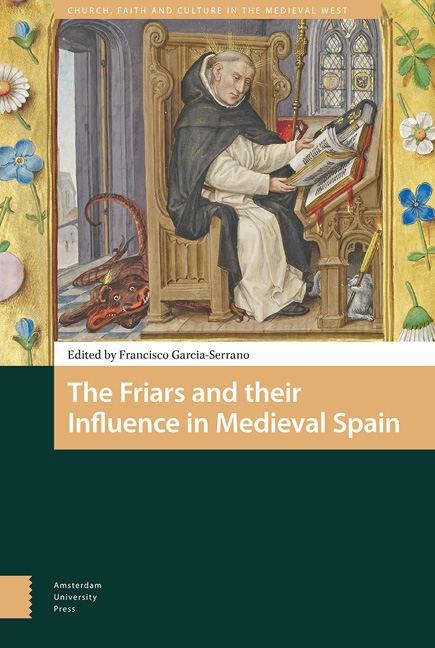Book contents
- Frontmatter
- Contents
- Abbreviations
- List of Illustrations
- Acknowledgements
- Introduction
- 1 Dominicus Hispanus
- 2 Ramon de Penyafort and His Influence
- 3 The Mendicant Orders and the Castilian Monarchy in the Reign of Ferdinand III
- 4 Ramon Marti, the Trinity, and the Limits of Dominican Mission
- 5 Narrative and Counter-Narrative: Dominican and Muslim Preaching in Medieval Iberia
- 6 The Poor Clares of Alcocer and the Castilian Crown (Thirteenth to Fifteenth Centuries)
- 7 Friars and Nuns: Dominican Economy and Religious Identity in Medieval Castile
- 8 Networks of Dissent and the Franciscans of the Crown of Aragon
- 9 Faction, Politics, and Dominican Inquisitors in the Fourteenth-Century Crown of Aragon
- 10 Sutzura e Viltat Carnal: The Place of Sin and Lust in the Treatises of the Franciscan Francesc Eiximenis (c.1400)
- 11 Valencian Dominicans Beyond the Convent of Santo Domingo
- 12 Ferdinand of Antequera and Santo Domingo el Real de Toledo: Patronage, Advice, and Spiritual Favour (c.1390–1416)
- Index
10 - Sutzura e Viltat Carnal: The Place of Sin and Lust in the Treatises of the Franciscan Francesc Eiximenis (c.1400)
Published online by Cambridge University Press: 16 February 2021
- Frontmatter
- Contents
- Abbreviations
- List of Illustrations
- Acknowledgements
- Introduction
- 1 Dominicus Hispanus
- 2 Ramon de Penyafort and His Influence
- 3 The Mendicant Orders and the Castilian Monarchy in the Reign of Ferdinand III
- 4 Ramon Marti, the Trinity, and the Limits of Dominican Mission
- 5 Narrative and Counter-Narrative: Dominican and Muslim Preaching in Medieval Iberia
- 6 The Poor Clares of Alcocer and the Castilian Crown (Thirteenth to Fifteenth Centuries)
- 7 Friars and Nuns: Dominican Economy and Religious Identity in Medieval Castile
- 8 Networks of Dissent and the Franciscans of the Crown of Aragon
- 9 Faction, Politics, and Dominican Inquisitors in the Fourteenth-Century Crown of Aragon
- 10 Sutzura e Viltat Carnal: The Place of Sin and Lust in the Treatises of the Franciscan Francesc Eiximenis (c.1400)
- 11 Valencian Dominicans Beyond the Convent of Santo Domingo
- 12 Ferdinand of Antequera and Santo Domingo el Real de Toledo: Patronage, Advice, and Spiritual Favour (c.1390–1416)
- Index
Summary
Abstract
This study offers a portrait of a moralist at the end of the fourteenth century, namely Francesc Eiximenis, a Franciscan author of diverse treaties dedicated to teaching the truths of the Christian faith. The chapter describes his life and work and his morality and teaching, above all what his works say regarding women, marriage, and sexuality. This study reveals not only the context of this morality but also what Eiximenis imagined a good Christian should be. This portrait of a moralist helps us to better understand the medieval world towards 1400 in all its complexity.
Keywords: Franciscans, medieval Aragon, religious history, Francesc Eiximenis
This current study has its starting point in a concern for human impulses (emotions, passions) and the moral discourses constructed around these impulses in the world that we call ‘medieval’. I am interested, among other issues, in the moralization of what we now know as ‘sexuality’ and the extent to which this moralization was shared by medieval men and women. Of course, I am not the first to determine that the main focus of my interest is not to be found in medieval texts. That is, the concept of ‘sexuality’ is a modern one and does not have a medieval equivalent; there are no texts explaining what we call ‘sexuality’. In fact, our concept would have appeared strange from a medieval point of view. They had others which were similar, such as that of the ‘carnal deed’ or ‘coupling’ (obra or ajustament carnal). But it is evident that neither of these concepts coincides precisely with our own concept of ‘sexuality’, and they turn out to be much more complex than our concept. Obviously sexual life was a medieval interest and several aspects of what we know as ‘sexuality’ were treated in detail, and these have been studied by historians in recent years. The reconstruction of the ‘sexual’ in the medieval period demands an ongoing effort to distinguish between their concept of sexuality and ours, and the historian must avoid projecting our current concepts onto the realities of the past.
The current study is focused on the vice of lust, which occupies a prominent place in certain medieval discourses about the ‘carnal deed’.
- Type
- Chapter
- Information
- The Friars and their Influence in Medieval Spain , pp. 221 - 246Publisher: Amsterdam University PressPrint publication year: 2018



